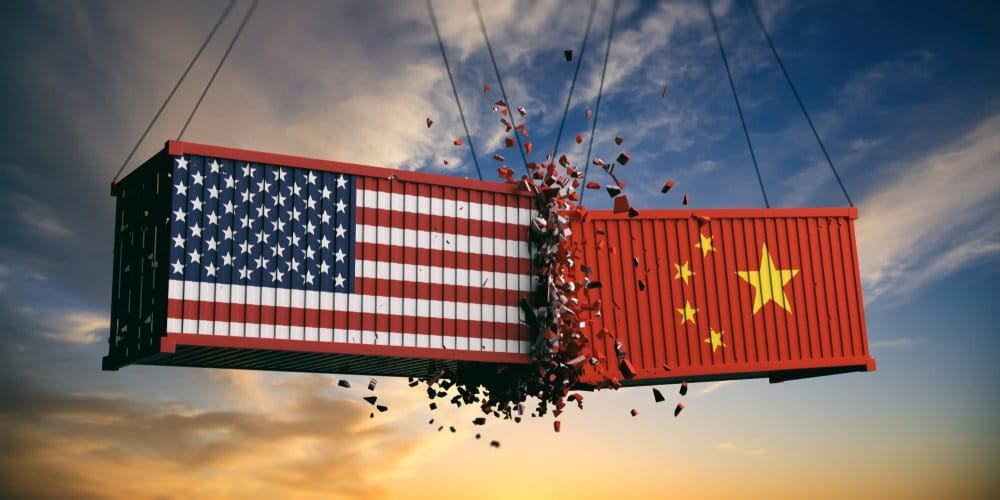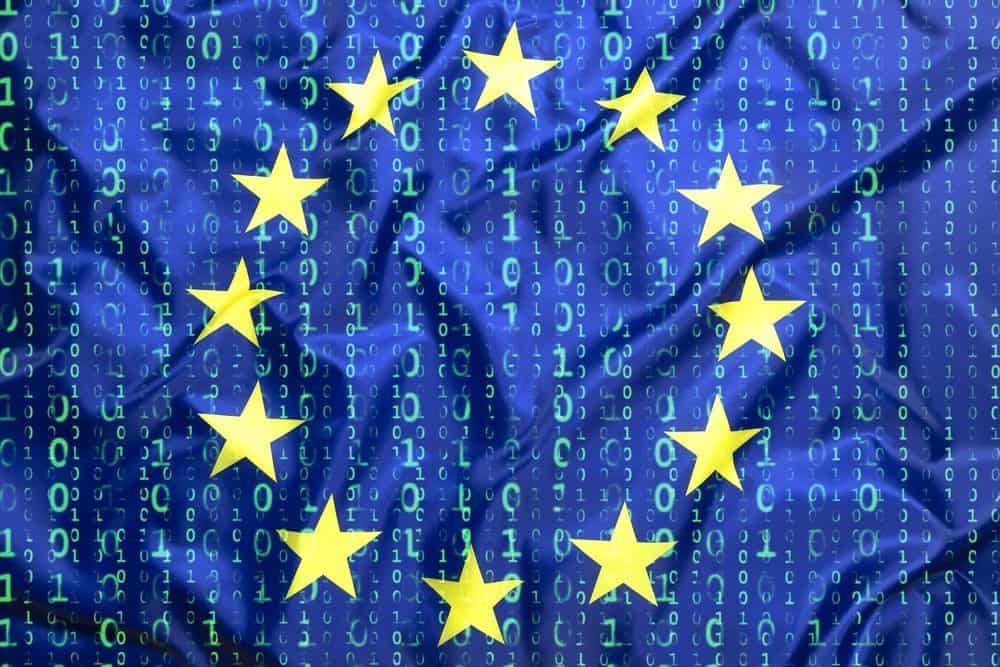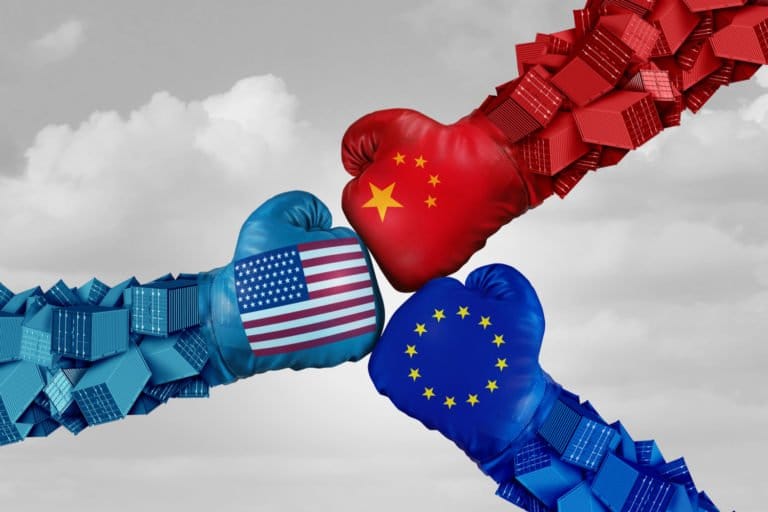The United States is in the process of increasing their dominance in the world. It does this by arguing with other countries, starting trade wars and by banning companies, products and services. The technology sector plays a major role in their attempt to stay in the lead. The trade war is focusing on China for now, but for how long? Europe is caught in the middle and is not doing anything, but shouldn’t Europe also show more ambition?
The United States has been the most powerful nation on earth since the Second World War. On several fronts that is crumbling and it is becoming clear that it is only a matter of time before other nations can measure or overtake the U.S. Certainly economically and technologically it is clear that China is taking huge steps forward. China has also set itself the goal of becoming the technological world leader by 2025. Something that the US seems to want to avoid at all costs.
Huawei is the first major victim
The first step was to ban the products of the Chinese company Huawei. According to the U.S. Huawei is be able to spy for the Chinese government with its network equipment and smartphones. The United States also demanded allies in Europe to do the same.
Read also: Trump turns Huawei into a threat to the U.S. economy
In Europe, the allies are not convinced and want to see evidence of Huawei spying for the Chinese government. Proof that the U.S. has never been able to provide. Some European countries did take precautions, and Huawei is no longer allowed to provide network equipment for the core of the mobile networks, but it is allowed to provide equipment for the rest of the network, and it can still sell smartphones. Something the U.S. is not very pleased with.
The fact that Huawei is not banned in Europe seems to result in an attempt by the U.S. to destroy the Chinese company completely. It is forbidden for all American companies or companies using American technology to do business with Huawei. As a result, Huawei is in serious trouble. The company cannot develop many of its products any further. The company is also losing many suppliers that it cannot easily replace. Huawei can no longer buy high performing chips, which are used in almost every Huawei product.
More information: To stop China’s world domination, Huawei has to die
TikTok is victim number 2
The popular social network TikTok, with which users create and share short videos, is the next victim. Again, the spying argument is used. TikTok could transfer user data to the Chinese government. The U.S. intelligence service, CIA, has indicated that it has found no evidence this has happened. Yet the Americans claim it is possible. After all, there is a law in China that states that companies must transfer data if the Chinese authorities ask for it. TikTok will, therefore, be forbidden in the U.S., unless they sell the company to an American company.

The U.S. accuses China of something the U.S. is doing for years
What the Americans seem to forget is that they have an identical law. The American government can also request data from all companies based in the United States. Even if that data is stored overseas. The Americans can do this without the intervention of a judge, and the companies in question must keep this a secret. Some tech giants oppose this, so it is unclear how often it happens. Still, the laws are identical: companies are obligated to transfer data in secret to national intelligence services if the government asks for it.
When is Europe going to get involved?
Europe is not doing anything for the time being. In Europe, they are talking about introducing a tax for big tech companies or maybe forcing American tech giants to split up in smaller companies. Something they argue about with the U.S. who will threaten to put extra taxes on French wines or German cars. Soon it will undoubtedly be the turn for Dutch cheese and tulips. The real problem in tech is not much spoken about; the technological power of the U.S. and possibly also China.
Europe will have to strive for a kind of technological balance. Just as there has been a kind of economic balance between the U.S., Europe and China for years. If they all need each other, they are forced to keep working together. If 99 percent of the technology comes from one country, there will be an imbalance. Especially now that the United States has become increasingly protectionist in recent years. It even uses its power to bring companies like Huawei and TikTok down. Which in turn, is to the advantage of American technology companies.

Europe has no tech industry
In this technological world domination, Europe currently has very little to say. Most technology comes from the United States, followed by China, South Korea, Japan and then Europe comes into play. Europe does far too little to build its own tech industry.
If we look at the top ten players in the European tech industry, we come to the following list:
- SAP (168.22 billion euros)
- ASML (EUR 133.67 billion)
- Adyen (EUR 42.9 billion)
- Dassault systems (EUR 40.30 billion)
- Spotify (EUR 39.33 billion)
- NXP (EUR 29.35 billion)
- Delivery Hero (19.41 billion euros)
- Zalando (EUR 16.98 billion)
- Just Eat Takeaway EUR 14.35 billion)
- Logitech (10.56 billion euros)
This makes the top 10 worth € 515.07 billion. If we look at the American tech sector, we see that Apple is already worth 1622 billion euros. So Apple is three times bigger than the ten biggest European tech companies combined. Amazon and Microsoft are also three times bigger. Google is twice as big, but is probably growing faster than the European players combined. Companies like Facebook, Intel, Cisco, Oracle, Adobe, Salesforce, Nvidia, Netflix, Qualcomm complete the top 10 in the U.S. and are all worth more than 100 billion euros.
Also in South Korea and Japan, they are doing a better job than Europe. There they invest heavily in the tech industry, and the government is very protective in terms of acquisitions by foreign players. Europe needs to do more if it wants to compete with the US and China.
If we look at the proposed EU budget for the next seven years, for example, the focus will once again be on traditional sectors such as agriculture rather than severe investments in innovation and technology. In Europe, they still look at conventional investments, but there is no vision of the future.
What can Europe do to improve its position?
Europe can take a number of steps to improve its position in the world of technology. These vary widely, but all have a price tag in the end.
Better fiscal conditions
Europe will have to create better fiscal conditions for startups, so that it is easier to grow for a startup. It is a common complaint of startups that the conditions in Europe are limiting their growth. While the United States offers them more freedom and possibilities.
European startups often open an office in the US to relocate activities because it is cheaper, and they have more opportunities with external investors. It is up to the financial experts to create a better entrepreneurial environment and tax system for startups in Europe.
The same goes for big investors. As a startup, you can simply raise a lot more money to develop your business in the U.S. than in Europe. That also has to do with regulation. Also, Europe could set up its own investment fund to invest in potential startups. Investments can be done through subsidies or by buying shares.
Holding on to important technology, approving fewer takeovers
Europe should also look more critical at acquisitions of European companies by companies from outside Europe. Many potential startups are acquired by large American tech companies. This also has to do with the fact that there are not enough big technology players in Europe who are interested in these startups.
Eventually, there will have to be more large tech companies in Europe. Europe won’t make it with just SAP. Europe should also protect individual companies from being acquired by companies outside of Europe. SAP, for example, but also a company like ASML and, if still possible, NXP. The latter is already half American. Without ASML, it is impossible to produce new chips. As long as that company is in European hands, Europe still has something to say. With Nokia and Ericsson, Europe also has two essential manufacturers of mobile networks.

Let European investment bank buy companies
Within Europe, an investment bank could get the mandate to buy crucial or essential technology companies. This would enable Europe to strengthen its technology industry and ensure that European alternatives emerge in the event of major technological progress. For example, all major cloud providers now come from the U.S. or, in some cases, China. That is irreversible.
If we had to name a company that Europe could buy to strengthen its tech industry, we think of ARM. ARM is originally a British chip designer that was acquired by the Japanese Softbank. ARM’s chip designs are the foundation of all chips used in mobile products such as smartphones, tablets and wearables. In addition, ARM is now gaining ground in the data center. The PC market is expected to follow soon. ARM could be a very strategic purchase. However, there is now a good chance that Nvidia, an American chip manufacturer, will take over ARM. Which means the U.S. tech industry will become even stronger.
Another example from the past is that IBM decided to divest its PC and server division. At the time, this was bought by Lenovo, originally a Chinese company, but now operating on a worldwide scale. In addition, there are plenty of companies that are on their way to become a large multinational. These companies are still affordable for Europe. The question remains, does Europe dare to take such a step, which will put more pressure on the relationship with the U.S.?
Protectionism vs Free Trade
We understand that these measures go against free trade and are protectionist. The fact is that the U.S. is currently doing exactly the same by wrecking Chinese companies. Or trying to get them to sell their technology to a U.S. company. But also by putting pressure on European member states.
There are plenty of European member states that try to influence European legislation so their national industry can benefit. If the national interest can be put first, then that should be possible at a European level as well? If Europe does nothing, all crucial technology will come from the United States in a few years’ time. The question is if that is acceptable, if Europe is completely dependent on U.S. technology. In the end that could also lead to a hefty price tag.
Returning to the title of this article: Should Europe also compete for technological world domination? Or at least ensure that it can play a part in the world of technology? Unfortunately, at this rate, very little European technology will remain.
